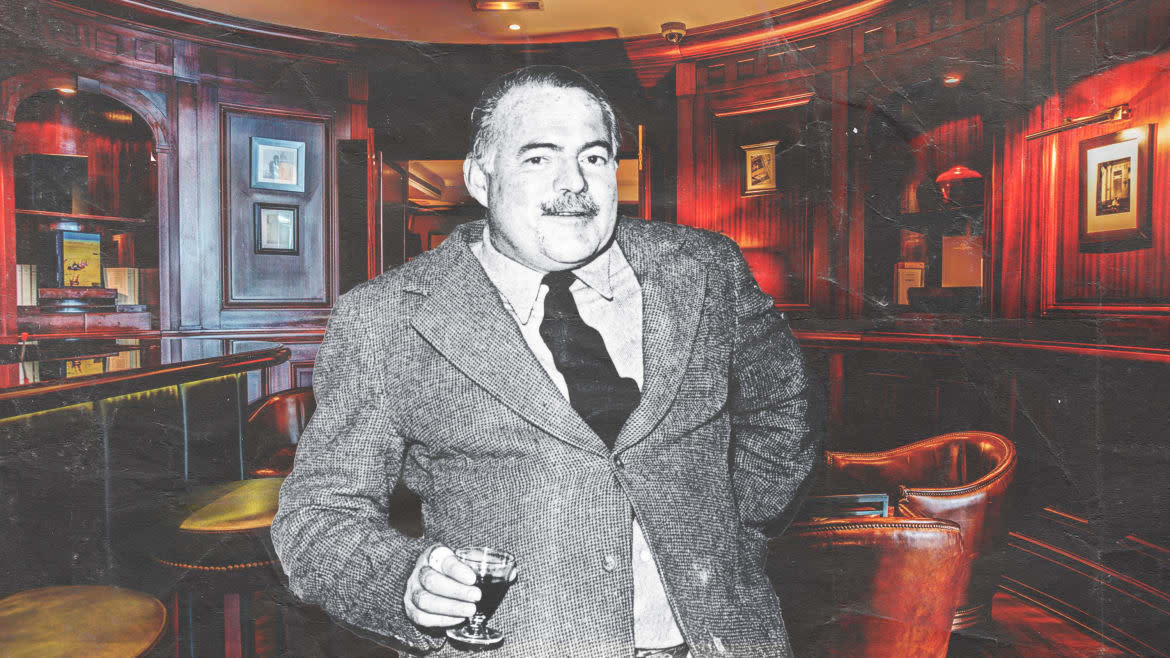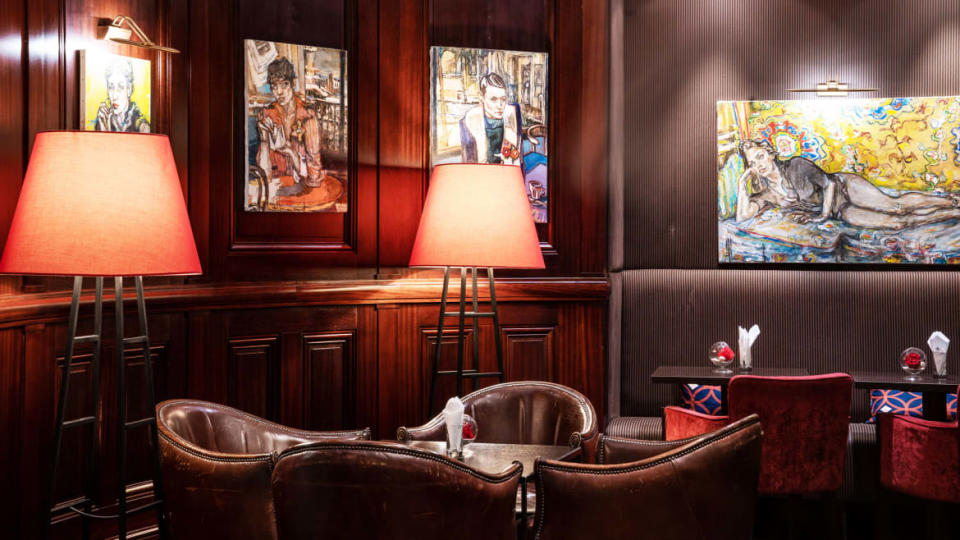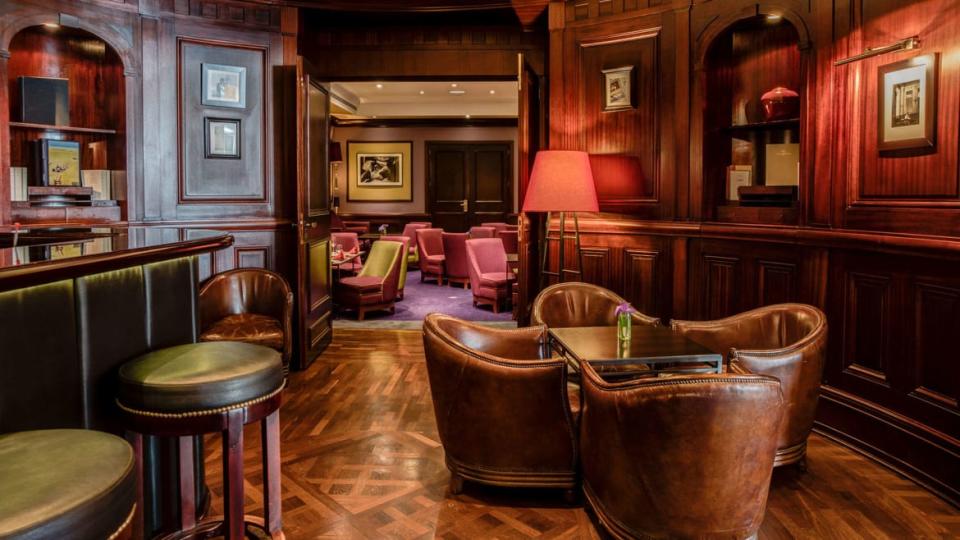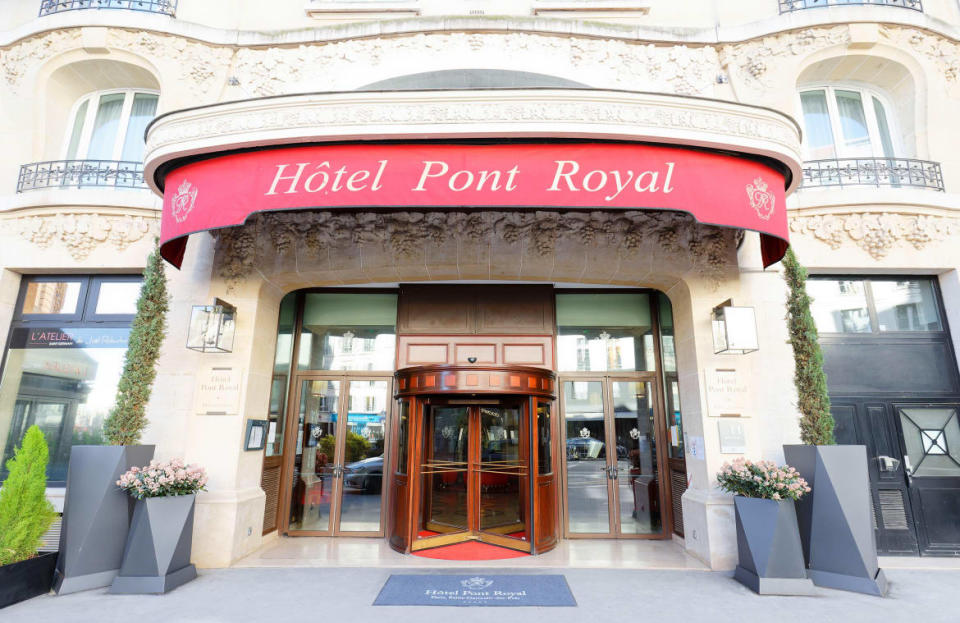The Paris Bar Where Hemingway (and History) Blacked Out

- Oops!Something went wrong.Please try again later.
- Oops!Something went wrong.Please try again later.
PARIS—The tiny Left Bank bar where Zelda Fitzgerald swilled some of the City of Light’s first cocktails, Henry Miller drank during writing breaks, and Simone de Beauvoir and Truman Capote lobbed blistering insults at each other—the latter likened by the former to a small white mushroom—is easy to miss.
For starters, it’s situated in the Hôtel Pont Royal, a five-star establishment off the Rue du Bac that’s devoid of the extreme Rococo flourishes or disco-colored supercars out front that are standard markers of Paris luxury hotels.
“Smart but not flashy,” is how the South African actor Neville Philips described it in his memoir.
Even the Rue de Montalembert on which the Pont Royal sits, is short and unassuming. In addition to the Pont Royal and its attached restaurant (the Michelin-starred Atelier de Joël Robuchon), the street houses a similarly inconspicuous upmarket hotel, as well as a musical instrument shop specializing in bespoke oboes and English horns.
The discreet location seems fitting for a bar where 20th-century literary luminaries not only congregated, but also went to hide out. But more on that later.
Capote described the Pont Royal’s watering hole as “a leathery little basement bar,” evoking an image of a tiny underground haunt filled with young, broke scribes and pungent clouds of nicotine. Today, it’s called Bar Signature, and I was disappointed to learn that it was moved from its cellar-level location during an extensive renovation a few decades ago. A snug fitness center has taken its place in the basement, while the bar sits just off the ground floor near the lobby.
Even so, there’s an echo of a Jazz Age-era speakeasy in the mahogany panels, vintage-style newspaper rack, and slightly weathered leather chairs, as well as a whiff of the iconic Hemingway Bar across the river at the Ritz. That is, if the bar had a less popular, less glitzy little sister. It’s the kind of place you would want to settle in for a low-key happy hour, or a tea (or something stronger) during a biting January afternoon.

Speaking of cocktails, when the bar opened in the 1920s it was among the first in the French capital to serve mixed drinks—an act that was viewed as somewhat sacrilegious in early 20th-century France. While Parisians initially avoided the joint, the American and British expatriate writers were intrigued, and it wasn’t long before the Pont Royal’s little bar became a gathering place of would-be and established literary celebrities.
F. Scott and Zelda Fitzgerald were regulars along with Ernest Hemingway, and Radclyffe Hall wrote her trailblazing 1928 lesbian novel, The Well of Loneliness, while holed up in a room upstairs. According to the Pont Royal’s website, Picasso and Dali crossed paths at the bar, “but acted as if they did not recognize one another.” Delicious though this bit of trivia may be, I was unfortunately unable to verify it.
The tiny bar’s rich history doesn’t end with les années folles either. Even after the Fitzgeralds had left Paris and the Hemingways had decamped for Key West, it remained a literary epicenter among the French and international intelligentsia. During the early ’30s, for instance, the infamous enfant terrible of American letters, Henry Miller, would often come in for drinks between drafts of Tropic of Cancer and Tropic of Capricorn.
Even the horrors of World War II didn’t quash the hotel and its bar, although they did significantly dampen the party.
“The concierge at the Pont-Royal on the rue du Bac wore tails, but the sleeves were unraveling, and his chin always showed little nicks from having shaved with cold water,” the famed playwright Arthur Miller wrote in his memoir, recalling a dreary post-war stay in the hotel, where a “hungry-looking, garishly got-up” young prostitute stationed in the lobby eyed him with “a philosopher’s superior curiosity.”
The brass bars across the revolving doors were missing “like a lot of plumbing and metal fittings stolen by the Germans in the last desperate months,” and every day, the hotel concierge with the frayed sleeves had to run across town and back to feed his rabbits.
“Rabbits,” Miller added, “were saving a lot of people.”
Despite the bleakness of those early post-war days, the city (and the hotel) bounced back, and the late ’40s and ’50s saw a new wave of literary lions take a seat at the Pont Royal’s underground bar, including Jacques Prévert, Arthur Koestler, Françoise Sagan, and Aldous Huxley.

Among the most famous regulars were philosopher power couple Sartre and de Beauvoir, who initially came to seek refuge from the overzealous fans who were hounding them at the nearby Café de Flore. It was there that they crossed paths with Capote, who was residing at the Pont Royal in “a small room under the eaves.” The encounter didn’t go well.
Unimpressed with Capote’s first book, de Beauvoir reportedly enjoyed making jokes at the young writer’s expense. According to British historian Antony Beevor, de Beauvoir “compared the tiny American in his over-large white jersey and pale-blue velvet trousers, to a ‘white mushroom’; and laughed with the barmen who pointed out that his first name was that of the President of the United States, while his surname was the French slang for condom.”
Capote took revenge in true literary fashion by demolishing both Beauvoir and Sartre in a scathing passage of his unpublished novel Answered Prayers:
“Wall-eyed, pipe-sucking, pasty-hued Sartre and his spinsterish moll, Beauvoir, were usually propped in a corner [of the bar] like an abandoned pair of ventriloquist’s dolls.”
Ouch.
He was gentler with Sartre’s friend and contemporary Albert Camus, however, describing the celebrated existentialist as “reedy, diffident in a razory way, a man with crisp brown hair, eyes liquid with life, and a troubled, perpetually listening expression.”

The entrance to Hotel Pont Royal, located in the Saint Germain-des-Pres quarter of Paris.
The bar was also a preferred haunt of legendary author James Baldwin, who fled to Paris to escape the rampant racism in the U.S., and later found fame in the French capital. Gabriel García Márquez lived at the hotel and also hung out at the bar, as did Rosamond Bernier, the journalist and fashion aficionado, who founded the Paris-based contemporary arts magazine, L'Oeil.
“The bar was a congenial meeting place for both artists and writers because the great publishing house of Gallimard was just down the street,” Bernier recalled in an interview a few years before her death in 2016.
“A number of Gallimard authors whom I knew would meet in the bar. I met Georges [her husband and co-founder of L'Oeil] with Jacques Lacan.”
Gallimard is indeed a few minutes’ walk from the hotel, just as it was in Bernier’s day, and rumor has it that editors and authors have maintained the tradition of congregating at the bar for drinks and business banter.
But Zahia Challal, the Pont Royal’s sales manager, told me that a typical repeat customer is a regular at the attached restaurant who pops into the bar for a pre-dinner drink. Travelers from the U.S. and Europe, she said, are far more common than French literati.
“Publishing houses have closed, and the publishing landscape has changed,” she explained. “Both in Paris and around the world.”
Indeed, during my visit I found myself seated in front of a small table of older American tourists. I nursed my too-sweet elderberry cocktail and leafed through my notes, only half-listening to their conversation that spanned everything from the Elon Musk Twitter buy-out to Netflix’s recent profit losses to (intriguingly) Rasputin.
Dimitri Olin, who reminded me of a younger, Eastern European Christian Bale, has been the barman at Signature for around six years. He confirmed that the bar had been moved from the basement decades ago, although he couldn’t give me an exact date.
“They brought the chairs up from the original bar,” he said, and I felt at once thrilled and slightly deflated that the only thing linking the bar’s 21st century’s incarnation with the one Camus and his cronies knew was the cushions for our hindquarters.
When I asked him about the typical clientele, Olin echoed the sale’s manager’s earlier remarks about foreign tourists comprising the bulk of their patrons. As if proving his point, a burly, sartorially challenged American in baggy khaki shorts lumbered in and inquired about a drink order. I returned to my table.
My partner joined me a short time later, and graciously agreed to swap my treacly concoction with his more tart, Passoã-based one. He listened patiently as I regaled him with tales of the bar’s basement heyday, ultimately agreeing that the astounding history and overall coziness made the place worth the metro trip across town.
We sampled a different vodka and Passoã-based cocktail called Passion Sour, and I went to check out the lounge, where I was pleased to find plenty of books, as well as a pine-green porcelain wood stove. A man in a leather jacket appeared to be dozing in a corner chair.
The writers may have moved on, but their legacy (and their bar chairs) remains. As does a certain discreet elegance that French celebrities, literary or otherwise, would appreciate.
Despite the bar’s lengthy history and dazzling roster of literary legends, it has somehow managed to retain the same subdued, hiding-in-plain-sight quality that originally attracted the likes of de Beauvoir who just wanted to sip her cocktail in peace.
And in today’s age of selfies and unrepentant flashiness, that is certainly worth raising a glass to.
Get the Daily Beast's biggest scoops and scandals delivered right to your inbox. Sign up now.
Stay informed and gain unlimited access to the Daily Beast's unmatched reporting. Subscribe now.

